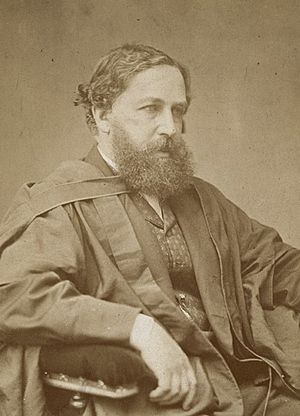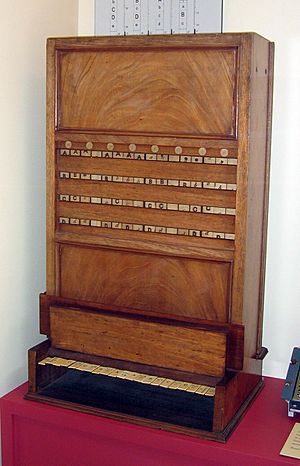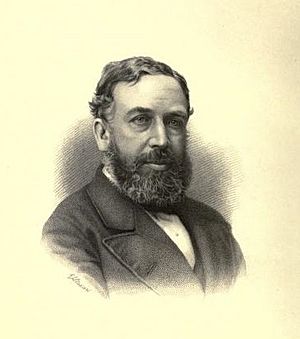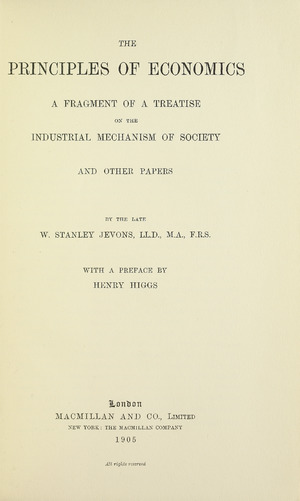William Stanley Jevons facts for kids
Quick facts for kids
William Stanley Jevons
|
|
|---|---|
 |
|
| Born | 1 September 1835 Liverpool, Lancashire, England
|
| Died | 13 August 1882 (aged 46) Bexhill-on-Sea, Sussex, England
|
| Alma mater | University College London |
| Known for | Marginal utility theory Jevons paradox |
| Children | Herbert Stanley Jevons |
| Scientific career | |
| Fields | Economics Logic |
| Institutions | University College London (1876–1880) Owens College (now University of Manchester) (1863–1875) |
| Academic advisors | Augustus De Morgan |
| Influences | Bentham · Condillac · Cournot · J. S. Mill · Ricardo · Smith |
| Influenced | Fisher · Marshall · Popper · J. K. Mehta · Herbert Stanley Jevons (Son) · Rybarski |
| Signature | |
| Notes | |
|
While not a formal advisor (Jevons lived before the introduction of the PhD to Britain), De Morgan was his most influential professor.
|
|
William Stanley Jevons (born September 1, 1835 – died August 13, 1882) was an important English economist and logician. An economist studies how people make choices about money and resources. A logician studies how we reason and think clearly.
Jevons helped start a new way of thinking in economics. He believed that economics could be studied using mathematics. He also developed the idea of "marginal utility." This means that the more of something you have, the less extra happiness or "utility" you get from one more unit of it. For example, the first slice of pizza is amazing, but the tenth slice might not be as good.
His ideas, along with those of other thinkers like Carl Menger and Léon Walras, changed how economists understood value. He also became famous for the "Jevons paradox". This idea suggests that making something more efficient (like using less coal for energy) can actually lead to using more of it overall, because it becomes cheaper.
Jevons also made big contributions to the field of logic. He even invented a mechanical computer called the "logic piano." This machine could solve logic problems.
Contents
Early Life and Studies
William Stanley Jevons was born in Liverpool, England. His father was an iron merchant and also wrote about law and economics. His mother, Mary Anne Jevons, came from a well-known family.
When he was 15, Jevons went to University College School in London. He felt he was meant to achieve great things as a thinker. After two years at University College London, where he studied chemistry and botany, he got a job offer. He was asked to work as an assayer (someone who tests metals) at a new mint in Sydney, Australia.
His family had faced financial difficulties, so he accepted the job. He left the UK for Sydney in June 1854. In Australia, he became very interested in political economy, which is another name for economics. He wrote letters to his family describing his life and even took photographs of Sydney.
Return to England and Academic Career
After five years, Jevons returned to England in 1859. He went back to University College London to continue his studies. He earned degrees from the University of London. He then focused on moral sciences, which included philosophy and economics.
His interest in science never faded, and his knowledge of physics helped him write his main logic book, The Principles of Science. Soon after getting his master's degree, Jevons became a tutor at Owens College in Manchester. In 1866, he became a professor there, teaching logic, philosophy, and political economy.
Understanding Utility and Value
Early in his career, Jevons developed his most important ideas in economics and logic. He wrote about his theory of "utility" in a letter in 1860. Utility means the usefulness or satisfaction you get from something.
He believed that the value of a product depends on how much satisfaction you get from an additional unit of it. This idea became known as "marginal utility theory". He also thought that economics should be studied using mathematics. He wrote a paper about this in 1862 called "A General Mathematical Theory of Political Economy."
This paper didn't get much attention at first. But in 1871, his book The Theory of Political Economy came out. In this book, he fully explained his ideas. He showed that value comes from utility, not just from the cost of making something. This was a big change in economic thinking and helped start the "marginal revolution" in economics.
Practical Economic Ideas
Jevons first became widely known for his writings on practical economic issues. His books like A Serious Fall in the Value of Gold (1863) and The Coal Question (1865) made him a leading expert.
In The Coal Question, Jevons warned that Britain's coal supplies were running out. He also introduced the idea now called the Jevons paradox. This paradox states that when technology makes energy use more efficient, people tend to use more energy, not less. This is because the cost of using energy goes down, so people find new ways to use it. Because of this work, Jevons is seen as one of the first economists to think about the environment and the economy together.
He also wrote about money in Money and the Mechanism of Exchange (1875). He even explored a strange idea: that business cycles (ups and downs in the economy) might be linked to sunspots on the sun. He thought sunspots affected weather, which affected crops, which then affected the economy. While this idea is not widely accepted today, it shows his creative thinking.
Logic and the Logic Piano

Jevons made major contributions to logic. In 1864, he published Pure Logic, which built on the work of George Boole. Jevons wanted to make logic simpler and clearer.
He developed a key principle of reasoning: "Whatever is true of a thing is true of its like." He even created a "logical abacus" to help solve logic problems. This led to his most famous invention in logic: the "logic machine," often called the "Logic Piano." He had it built in 1869, and it looked like an upright piano. This machine could perform simple logical tasks. It was shown to the Royal Society in 1870.
In 1871, he published Elementary Lessons on Logic, which became a very popular textbook for students learning logic. His most important work on logic was The Principles of Science (1874). In this book, he explained how induction (making general rules from specific observations) is like the opposite of deduction (using general rules to predict specific outcomes). He also wrote about probability and how it relates to logic.
Jevons's Number
In his 1874 book Principles of Science, Jevons wrote about a large number: "Can the reader say what two numbers multiplied together will produce the number 8,616,460,799? I think it unlikely that anyone but myself will ever know."
This number became known as Jevons's number. It was later figured out by others. It is the result of multiplying two prime numbers: 89,681 and 96,079. A prime number is a whole number greater than 1 that has no positive divisors other than 1 and itself.
Personal Life and Legacy
In 1867, Jevons married Harriet Ann Taylor. Her father founded the Manchester Guardian newspaper. Jevons often struggled with poor health and sleeplessness. Teaching many subjects was very tiring for him.
In 1876, he moved to University College, London to become a professor of political economy. He enjoyed traveling and music, but his health remained poor, and he sometimes felt depressed. He found his teaching duties increasingly difficult and decided to resign in 1880 to focus on his writing.
Sadly, on August 13, 1882, William Stanley Jevons drowned while swimming near Hastings. He was buried in Hampstead Cemetery.
Jevons was a very productive writer. By the time he died, he was a leading figure in both logic and economics in the UK. The famous economist Alfred Marshall said that Jevons's work in economics was very important and had a lot of "constructive force." His ideas continue to influence thinkers today.
Works
- 1862. A General Mathematical Theory of Political Economy
- 1863. A Serious Fall in the Value of Gold
- 1864. Pure Logic; or, the Logic of Quality apart from Quantity
- 1865. The Coal Question
- 1869. The Substitution of Similars, The True Principle of Reasoning
- 1870. Elementary Lessons in Logic
- 1871. The Match Tax: A Problem in Finance
- 1871. The Theory of Political Economy
- 1874. Principles of Science
- 1875. Money and the Mechanism of Exchange
- 1878. A Primer on Political Economy
- 1880. Studies in Deductive Logic
- 1882. The State in Relation to Labour
- 1883. Methods of Social Reform and Other Papers
- 1884. Investigations in Currency and Finance
- 1886. Letters and Journal of W. Stanley Jevons
Images for kids
See also
 In Spanish: William Stanley Jevons para niños
In Spanish: William Stanley Jevons para niños
 | Sharif Bey |
 | Hale Woodruff |
 | Richmond Barthé |
 | Purvis Young |





